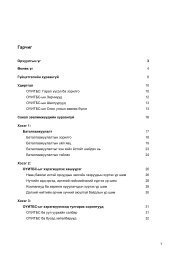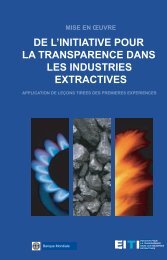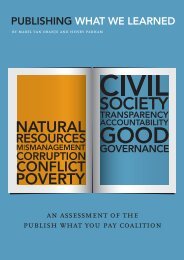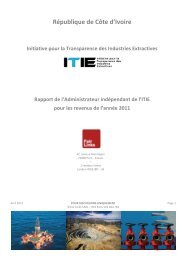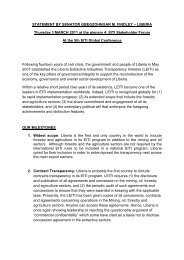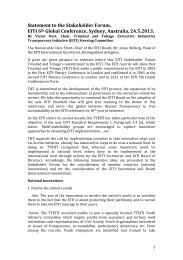Second National Reconcilation Study EITI Peru - unofficial…
Second National Reconcilation Study EITI Peru - unofficial…
Second National Reconcilation Study EITI Peru - unofficial…
You also want an ePaper? Increase the reach of your titles
YUMPU automatically turns print PDFs into web optimized ePapers that Google loves.
Consultoría para la Elaboración del Segundo Estudio Nacional de<br />
Conciliación de la Iniciativa de Transparencia para las Industrias<br />
Extractivas (ITIE) en el Perú (2008 – 2010) (continuación)<br />
Next, we will describe the payment typologies that are examined in the <strong>Second</strong> <strong>Study</strong>:<br />
IV.1. Income Tax<br />
1. General Aspects<br />
1.1. Concept<br />
Income Tax -<br />
The Third Category Income Tax is the tax that the companies pay on income or earnings that are<br />
obtained for business activities, including: commercial, industrial, service-oriented or company-<br />
related activities. Generally, these revenues come from taxes on capital and work, which are<br />
understood as stemming from a durable source that is prone to generate periodic income.<br />
Domiciled taxpayers pay taxes on their income or annual earnings from global sources and must<br />
make advance tax payments.<br />
Mining -<br />
The mining canon corresponds to 50% of the Third Category Income Tax declared by mining<br />
companies. According to the Mining Canon Law, this corresponds to the “the Local and Regional<br />
Governments effective and adequate share of Total revenues and income obtained by the State for<br />
the exploitation of mineral, metallic and non-metallic resources.” According to this law, the<br />
resources obtained from the Canon will be used by Local and Regional Governments exclusively<br />
for the purpose of engaging in infrastructure works that have a regional and/or local impact.<br />
1.2. Legal base in place for the periods included in this <strong>Study</strong><br />
Income Tax -<br />
- D. S. N° 179-2004-EF, Texto Único Ordenado<br />
- D. S. Nº 122-94-EF y modificatorias, Reglamento del TUO.<br />
Mining Canon -<br />
- Ley Nº 27506 (published on July 10.,2001).<br />
- Regulated by D.S. Nº 005-2002-EF (published on January 09, 2002).<br />
- D.S. N° 003 -2003 - EF that modifies D.S. N° 005-200 2-EF- Reglamento de la Ley de Canon<br />
(published on January 09, 2003).<br />
- D.S. N° 115 -2003-EF, modifying D.S. N° 005-2002-EF which approved the Reglamento de<br />
la Ley de Canon (published on August 14, 2003).<br />
- Ley N° 28077 – Modification of Ley N° 27506 -Ley de Canon (published on September 26,<br />
2003)<br />
- D.S. N° 029 -2004-EF, modifying D.S. N° 005-2002-EF, by which the Reglamento de la Ley<br />
N° 27506, Ley del Canon was approved (published on February 17, 2004).<br />
- Ley N° 28322 – Modification of Articles Ley N° 275 06, Ley de Canon, modified by Ley Nº<br />
28077 (published on August 10, 2004)<br />
- D.S. N° 187 -2004-EF, modifying D.S. N° 005-2002-EF, through which the Regulations for<br />
1.3. Participants<br />
Ley N° 27506, Ley del Canon were approved (publishe d on December 22, 2004).<br />
- Taxpayers: Companies.<br />
Consultoría para la Comisión Multisectorial Permanente de la ITIE Perú<br />
39



